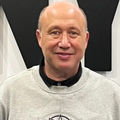Interviews
Two textile factories pay high environmental toll for export economy
02 Dec '10
4 min read
Greenpeace investigations have found widespread pollution, including high concentrations of heavy metals, in Xintang and Gurao, two textile factory towns in Guangdong province that make blue jeans and bras, respectively. Greenpeace calls upon the local government to launch an investigation into the sources of pollution and punish all responsible industrial culprits. It also calls upon the textile industry – the dominant industry of both towns – to review and clean up its manufacturing processes, starting with reducing and eliminating the use and release of priority hazardous chemicals during production.
Xintang is better known as the “Blue Jeans Capital of the World” – over 40% of its jeans are exported to the US, the EU, Russia and many other countries. It produces 260 million pairs of jeans annually, or more than 60% of China's total jeans production and equivalent to 40% of all the jeans sold in the US each year. Meanwhile, 80% of Gurao's economy is related to the underwear and lingerie industry. Each year, the “Capital of Sexy” produces 200 million bras, enough for one for every third woman in China.
“Xintang and Gurao are symbols of success in China's export-model economy, yet we were horrified by the environmental degradation we saw during our fieldwork visits from April to September,” said Greenpeace Toxics campaigner Mariah Zhao. “Though we cannot pinpoint the pollution sources definitively at this stage, it's worth noting that textile is the dominant industry in both towns by a long run.”
Testing by an independent laboratory revealed heavy metals such as copper, cadmium, and lead in 17 out of 21 samples of water and sediment from Xintang and Gurao. One sediment sample from Xintang contained cadmium at concentrations 128 times in excess of national environmental standards. “Dyeing, washing, bleaching, and printing are some of the dirtiest processes in the textile industry, requiring high volumes of water as well as heavy metals and other chemicals,” explained Zhao. “And Xintang is home to the complete blue jean manufacturing process, including dyeing, bleaching, and washing.”
Workers in the industry also testified to Greenpeace. “The water is discharged from the dyeing factories upstream. Sometimes it smells really awful. And every time the color of the water is different,” said Ren Shan (pseudonym), a migrant worker who moved to Gurao for a job in a textile factory.
“With China nicknamed 'the Factory of the World,' it's important to remember that Xintang and Gurao are emblematic of the larger problem of dirty textile manufacturing – they are just two of 133 textile industrial clusters in the country,” Zhao pointed out. “The responsibility of wastewater regulation and phasing out hazardous chemicals in textile manufacturing must be faced by not only Xintang and Gurao's industries and government, but also throughout China.”
“Jeans and bras are synonymous with a modern, sexy lifestyle, yet we need to think about what these fashion icons mean for our environment. With many people demanding new jeans and clothing every year, it is imperative that the textile industry implements clean production methods, starting by phasing out the use and release of hazardous chemicals. At the same time, the government must adopt and enforce strict hazardous chemical management policies,” said Zhao. “We also hope that consumers will join us in pushing for change from the government and their favorite clothing companies. It would be tragic if fashion and economics comes at the cost of China's clean water resources.”
Greenpeace is a non-profit organisation, with a presence in 40 countries across Europe, the Americas, Asia and the Pacific. To maintain its independence, Greenpeace does not accept donations from governments or corporations but relies on contributions from individual supporters and foundation grants.
Xintang is better known as the “Blue Jeans Capital of the World” – over 40% of its jeans are exported to the US, the EU, Russia and many other countries. It produces 260 million pairs of jeans annually, or more than 60% of China's total jeans production and equivalent to 40% of all the jeans sold in the US each year. Meanwhile, 80% of Gurao's economy is related to the underwear and lingerie industry. Each year, the “Capital of Sexy” produces 200 million bras, enough for one for every third woman in China.
“Xintang and Gurao are symbols of success in China's export-model economy, yet we were horrified by the environmental degradation we saw during our fieldwork visits from April to September,” said Greenpeace Toxics campaigner Mariah Zhao. “Though we cannot pinpoint the pollution sources definitively at this stage, it's worth noting that textile is the dominant industry in both towns by a long run.”
Testing by an independent laboratory revealed heavy metals such as copper, cadmium, and lead in 17 out of 21 samples of water and sediment from Xintang and Gurao. One sediment sample from Xintang contained cadmium at concentrations 128 times in excess of national environmental standards. “Dyeing, washing, bleaching, and printing are some of the dirtiest processes in the textile industry, requiring high volumes of water as well as heavy metals and other chemicals,” explained Zhao. “And Xintang is home to the complete blue jean manufacturing process, including dyeing, bleaching, and washing.”
Workers in the industry also testified to Greenpeace. “The water is discharged from the dyeing factories upstream. Sometimes it smells really awful. And every time the color of the water is different,” said Ren Shan (pseudonym), a migrant worker who moved to Gurao for a job in a textile factory.
“With China nicknamed 'the Factory of the World,' it's important to remember that Xintang and Gurao are emblematic of the larger problem of dirty textile manufacturing – they are just two of 133 textile industrial clusters in the country,” Zhao pointed out. “The responsibility of wastewater regulation and phasing out hazardous chemicals in textile manufacturing must be faced by not only Xintang and Gurao's industries and government, but also throughout China.”
“Jeans and bras are synonymous with a modern, sexy lifestyle, yet we need to think about what these fashion icons mean for our environment. With many people demanding new jeans and clothing every year, it is imperative that the textile industry implements clean production methods, starting by phasing out the use and release of hazardous chemicals. At the same time, the government must adopt and enforce strict hazardous chemical management policies,” said Zhao. “We also hope that consumers will join us in pushing for change from the government and their favorite clothing companies. It would be tragic if fashion and economics comes at the cost of China's clean water resources.”
Greenpeace is a non-profit organisation, with a presence in 40 countries across Europe, the Americas, Asia and the Pacific. To maintain its independence, Greenpeace does not accept donations from governments or corporations but relies on contributions from individual supporters and foundation grants.
Greenpeace
Popular News
Leave your Comments
Editor’s Pick
Dr. Michael Duetsch & Man Woo Lee
UPM Biochemicals and Dongsung Chemical
































-Ltd..jpg?tr=w-120,h-60,c-at_max,cm-pad_resize,bg-ffffff)





.jpg?tr=w-120,h-60,c-at_max,cm-pad_resize,bg-ffffff)
.jpg?tr=w-120,h-60,c-at_max,cm-pad_resize,bg-ffffff)






